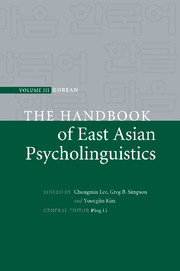Book contents
- Frontmatter
- Contents
- List of figures
- List of tables
- List of contributors
- Preface
- Introduction: Advances in Korean psycholinguistics
- Part I Language acquisition
- 1 Acquisition of the subject and topic nominals and markers in the spontaneous speech of young children in Korean
- 2 The acquisition of argument structure and transitivity in Korean: a discourse-functional approach
- 3 Acquisition of case markers and grammatical functions
- 4 Do Korean children acquire verbs earlier than nouns?
- 5 The acquisition of the placement of the verb in the clause structure of Korean
- 6 Learning locative verb syntax: a crosslinguistic experimental study
- 7 Language-specific spatial semantics and cognition: developmental patterns in English and Korean
- 8 Acquisition of negation in Korean
- 9 The acquisition of Korean numeral classifiers
- 10 Acquisition of Korean reflexive anaphora
- 11 The Korean relative clause: issues of processing and acquisition
- 12 The accessibility hierarchy in Korean: head-external and head-internal relative clauses
- 13 Development of functional categories in child Korean
- 14 The acquisition of modality
- 15 The syntax of overmarking and kes in child Korean
- 16 Events in passive development
- 17 Universal quantification in child grammar
- 18 Acquisition of prosody in Korean
- 19 Korean as a heritage language
- 20 Maturational effects on L2 acquisition
- 21 L2 acquisition of English articles by Korean speakers
- 22 The acquisition of wanna contraction by adult Korean learners of English
- 23 Phonological abilities of Korean–English bilinguals
- 24 Parameters on languages in contact: an altered view of codeswitching
- 25 Influence of socio-psychological categories in bilingual interaction
- 26 Ontological concept versus shape in word learning from a crosslinguistic point of view
- 27 Notes on Korean Sign Language
- Part II Language processing
- References
- Name index
- Subject index
21 - L2 acquisition of English articles by Korean speakers
from Part I - Language acquisition
Published online by Cambridge University Press: 05 June 2012
- Frontmatter
- Contents
- List of figures
- List of tables
- List of contributors
- Preface
- Introduction: Advances in Korean psycholinguistics
- Part I Language acquisition
- 1 Acquisition of the subject and topic nominals and markers in the spontaneous speech of young children in Korean
- 2 The acquisition of argument structure and transitivity in Korean: a discourse-functional approach
- 3 Acquisition of case markers and grammatical functions
- 4 Do Korean children acquire verbs earlier than nouns?
- 5 The acquisition of the placement of the verb in the clause structure of Korean
- 6 Learning locative verb syntax: a crosslinguistic experimental study
- 7 Language-specific spatial semantics and cognition: developmental patterns in English and Korean
- 8 Acquisition of negation in Korean
- 9 The acquisition of Korean numeral classifiers
- 10 Acquisition of Korean reflexive anaphora
- 11 The Korean relative clause: issues of processing and acquisition
- 12 The accessibility hierarchy in Korean: head-external and head-internal relative clauses
- 13 Development of functional categories in child Korean
- 14 The acquisition of modality
- 15 The syntax of overmarking and kes in child Korean
- 16 Events in passive development
- 17 Universal quantification in child grammar
- 18 Acquisition of prosody in Korean
- 19 Korean as a heritage language
- 20 Maturational effects on L2 acquisition
- 21 L2 acquisition of English articles by Korean speakers
- 22 The acquisition of wanna contraction by adult Korean learners of English
- 23 Phonological abilities of Korean–English bilinguals
- 24 Parameters on languages in contact: an altered view of codeswitching
- 25 Influence of socio-psychological categories in bilingual interaction
- 26 Ontological concept versus shape in word learning from a crosslinguistic point of view
- 27 Notes on Korean Sign Language
- Part II Language processing
- References
- Name index
- Subject index
Summary
Abstract
In this paper, we investigate how L2-learners whose L1s lack articles acquire the semantics of articles, with special focus on article use by L1-Korean learners of L2-English. Based on our experimental studies, we argue that article choice in L2-acquisition reflects systematic access to universal semantic features: definiteness, specificity, and partitivity. It is shown that L2-learners associate the with [+specific] and [+partitive] features, which results in non-random error patterns: overuse of the with specific indefinites and partitive indefinites. Our findings provide further evidence that L2 learners' errors are traceable to parameter settings that are not necessarily instantiated in their L1 or L2 – but which are available through UG. The paper also presents evidence that the interlanguage grammar of L2-learners has important parallels to that of child L1-learners in the domain of article semantics, supporting our conclusion that L2-acquisition, like L1-acquisition, is guided by UG.
Introduction
The fact that primary linguistic data under-determine unconscious knowledge of language has been considered strong evidence for postulating Universal Grammar (UG) (Chomsky, 1965, 1986b). While the argument was originally made for first language (L1) acquisition, it also holds for second language (L2) acquisition, with some caveats: if L2-learners' linguistic knowledge is not traceable to either transfer from the L1 or explicit instruction, this provides evidence for the guiding role of UG (for arguments of UG access in L2-acquisition, see Schwartz and Sprouse, 1994, 1996, among others).
- Type
- Chapter
- Information
- The Handbook of East Asian Psycholinguistics , pp. 286 - 304Publisher: Cambridge University PressPrint publication year: 2009
- 3
- Cited by

